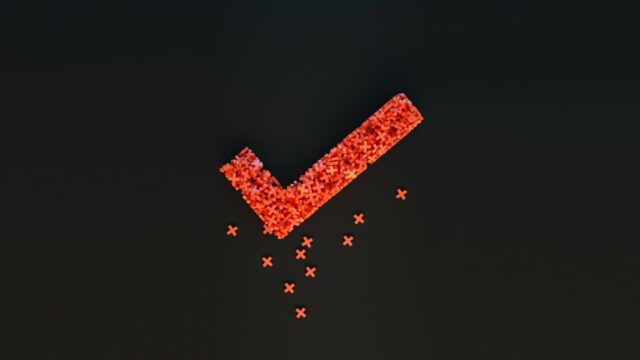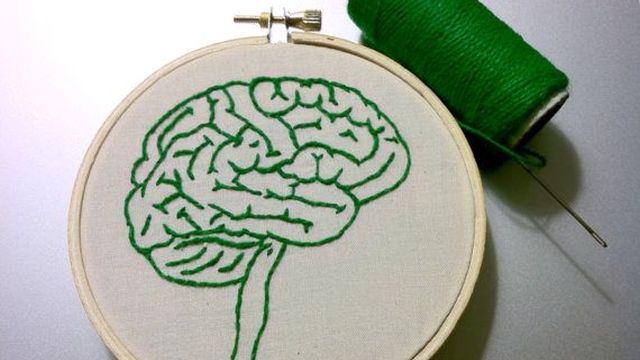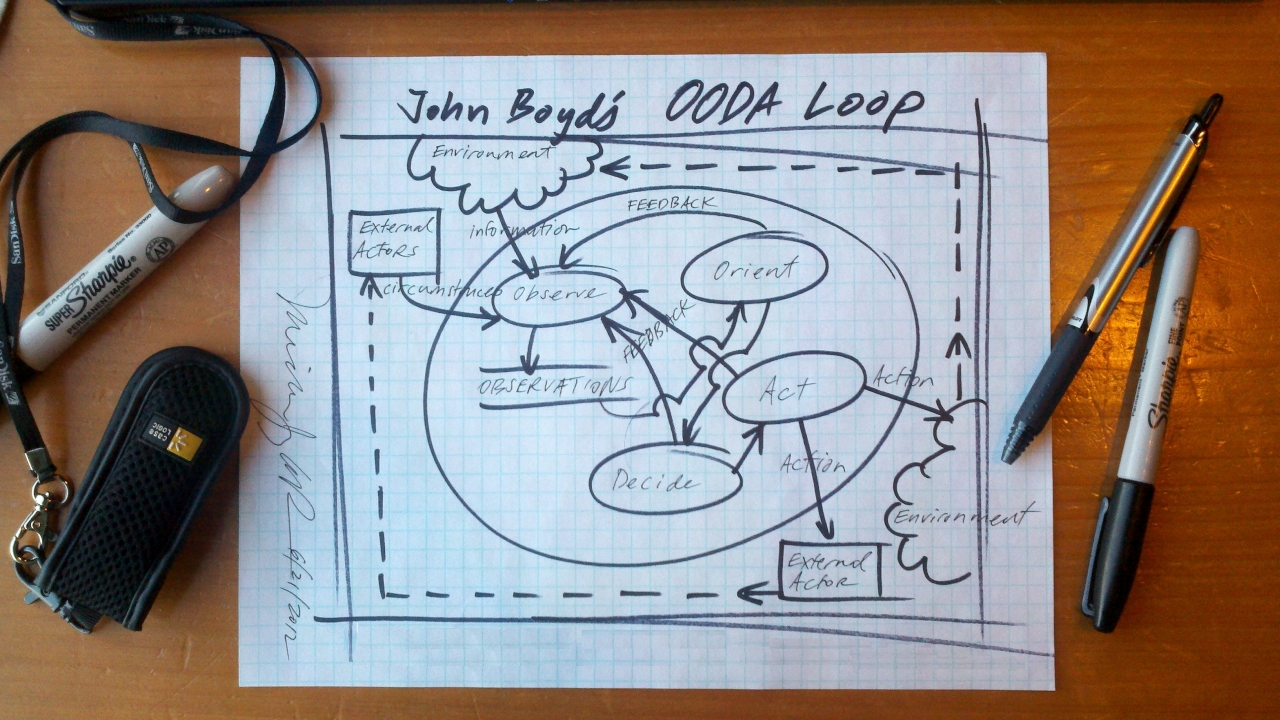
Creativity and the Mad Colonel’s OODA Loop
It is a state of mind, a learning of the oneness of things, an appreciation for fundamental insights known in Eastern philosophy and religion as simply the Way (or Tao). For Boyd, the Way is not an end but a process, a journey… The connections, the insights that flow from examining the world in different ways, from different perspectives, from routinely examining the opposite proposition, were what were important. The key is mental agility.
Grant Hammond.
Col John Boyd (also known as The Mad Colonel) developed and practiced his OODA Loop Way over decades. Some of us are familiar with a basic version of this Loop – Observe | Orient | Decide | Act. But the richness and depth of his Loop is so much more. He drew on a myriad of domains, for example thermodynamics, Kanban, mathematics, quantum mechanics, and military history.
The Loop is versatile and is used in a diverse range of contexts. Currently, I am using it in conjunction with Cynefin and liminality to navigate foundation-shifting personal change.
Since Creative Melbourne, in February 2018, I’ve been thinking about the practice of creativity from a few different perspectives – Musings from Creative Melbourne 2018, transformation … evolution, reflection and creativity. This article has a more practical flavour – practicing creativity through an OODA Loop lens, with some help from Terry Pratchett.
 Explore and learn new domains: “Open your eyes and then open your eyes again.” Terry Pratchett.
Explore and learn new domains: “Open your eyes and then open your eyes again.” Terry Pratchett.
Cultivating and strengthening our creativity can happen in a myriad of activities: whether we’re conceiving a new idea, searching for a fresh insight or discovering a different perspective on the familiar. To do this well it’s essential that we look outside of our familiar domains – for example as a learning and development (L&D) professional I deliberately immersed myself in the world of knowledge management. At the time I didn’t know how strongly the two complimented each other, this led to a recent fascination with the rabbit hole that is quantum mechanics! Developing your creativity muscle means us constantly exploring new domains. Which takes us to the next point…
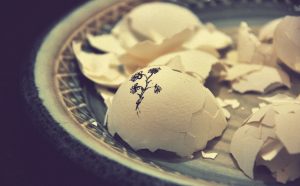 Discarding outdated paradigms and practices: “They say a little knowledge is a dangerous thing, but it’s not one half so bad as a lot of ignorance.” Terry Pratchett.
Discarding outdated paradigms and practices: “They say a little knowledge is a dangerous thing, but it’s not one half so bad as a lot of ignorance.” Terry Pratchett.
It takes courage to let go of comfortable and familiar mindsets (those lenses we regularly use to navigate and make sense of our world). However, there are times when these are inhibitive and prevent us from seeing new possibilities. As we practice our creativity we may find our existing paradigms are not enough … To make space for new mindsets we need to let go.
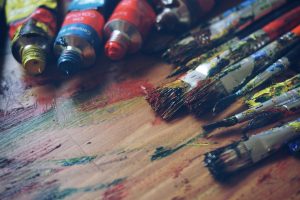 Creating fresh paradigms to stimulate new possibilities: “There isn’t a way things should be. There is what happens and what we do” Terry Pratchett.
Creating fresh paradigms to stimulate new possibilities: “There isn’t a way things should be. There is what happens and what we do” Terry Pratchett.
The beauty of exploring and pondering in new domains is that we begin to understand the philosophies, principles, and practices that shape and define these domains. When the moment comes to create a fresh paradigm, because we’ve accumulated a rich domain library, it’s much easier to draw on the relevant knowledge resources. We can do this by reading new genres, attending new information events, and connect with people outside our norm: from these force new connections and pattern-finding. For example: for a long time I believed that I wasn’t a musical person. This year I’ve discarded that mindset and am creating a fresh one by learning to play the ukulele.
 Adapt and adopt: “You need to believe in things that aren’t true. How else can they become?” Terry Pratchett.
Adapt and adopt: “You need to believe in things that aren’t true. How else can they become?” Terry Pratchett.
Domain exploration doesn’t stop with understanding their philosophies, principles, and practices. The gold is in how we adapt and adopt them into our iBoK (Individual Body of Knowledge) and the way we do things. Especially when we need to create a fresh paradigm, having an awareness of the diverse range of domains at our disposal is invaluable – as well as a critical element in developing a new mindset. Recently, I’ve been reflecting on an iBoK (Individual-Brad-Body of Knowledge) concept – an approach and tool to map domains that I use regularly as well as a space to note new domains. Since playing with this concept I’ve become more aware of other domains I want to spend more time understanding and learning from.
 Timing: “That’s the thing about time-travel, you’ve got all the time in the world.” Terry Pratchett.
Timing: “That’s the thing about time-travel, you’ve got all the time in the world.” Terry Pratchett.
Exercising creativity is not always moving at speed! Discerning how to use your time, and timing is an intuitive element in practicing creativity. We need to experiment with moving quickly, slowing down to review and adjust as well as set aside time to reflect. For example, I find that wandering the beach collecting shells is wonderfully calming. It clears the noise in my head, which creates the needed space for ideas to percolate and surface. This time has offered clarity around tricky questions, revealed new perspectives and insights on familiar topics as well as embedded new knowledge and information.
Article source: Terry Pratchett | Creativity | the Mad Colonel.
Image sources:
- Header image: © Michael LaRue, whitewingcrow.com.
- Explore and learn new domains: PxHere, Public Domain.
- Discarding outdated paradigms and practices: Netaly Reshef on Pexels, Public Domain.
- Creating fresh paradigms to stimulate new possibilities: PxHere, Public Domain.
- Adapt and adopt: George Desipris on Pexels, Public Domain.
- Timing: Jon Tyson on Unsplash, Public Domain.


